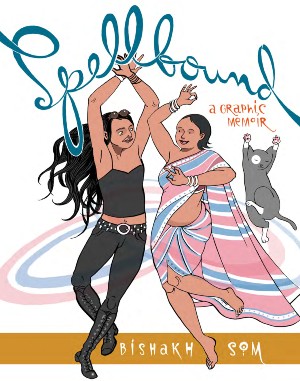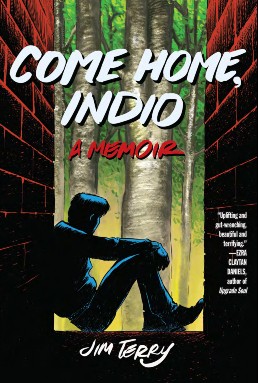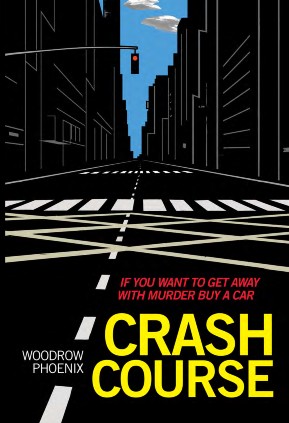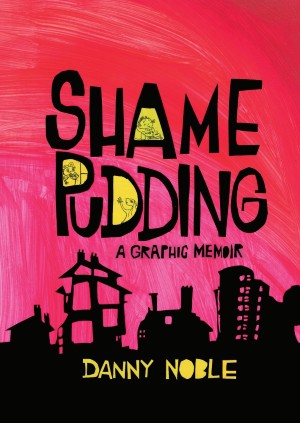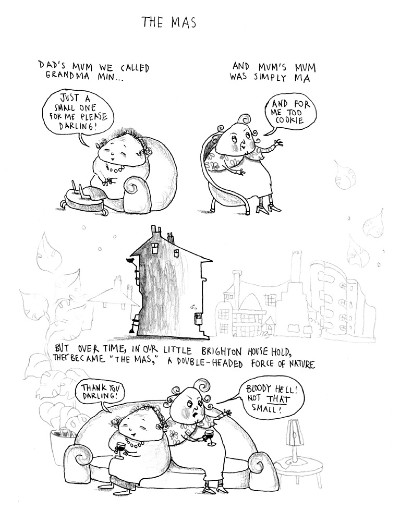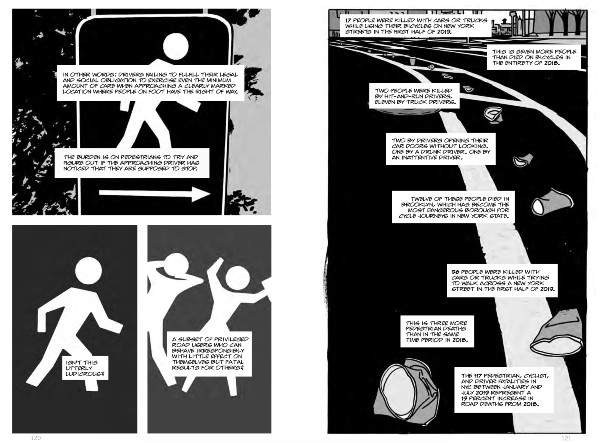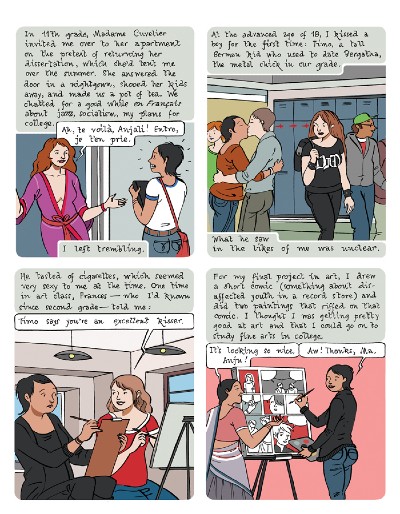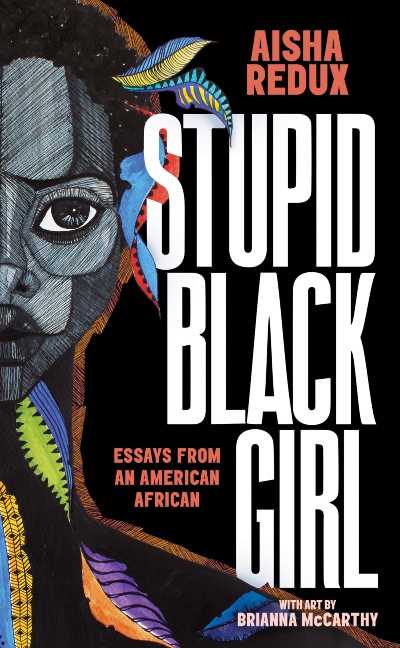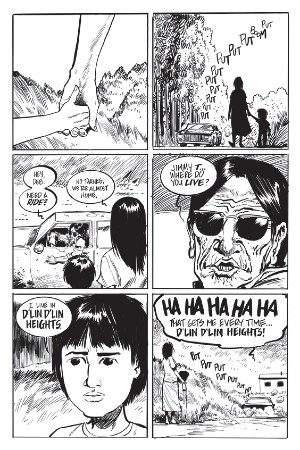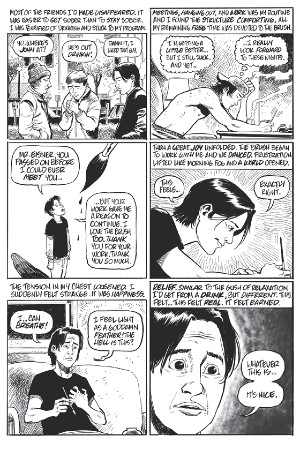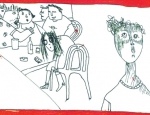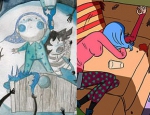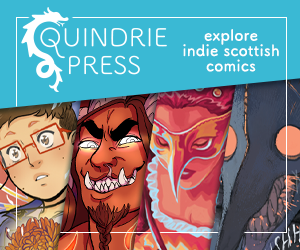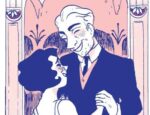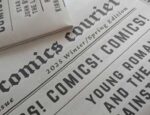With a focus on work that champions inclusivity and marginalised voices, new publishers on the indie comics scene Street Noise Books have a line-up of books that represents exactly the kind of list we look to prioritise coverage of at Broken Frontier (see our recent team statement here). We first featured them on the site when we reviewed Danny Noble’s graphic memoir Shame Pudding over the summer, the long-awaited debut graphic memoir from an artist who we’ve been spotlighting for many years at BF. Today I chat with Street Noise Books’ Liz Frances as we talk about their range of graphic memoirs, their target audience, and what we can expect to see from them going into 2021…
ANDY OLIVER: To begin with can you tell us a little about your own background in publishing prior to Street Noise Books?
LIZ FRANCES: I have been working in publishing for more than 20 years, as a book designer and an art director for major New York publishing houses, like Penguin and Macmillan, and most recently at Scholastic Children’s Books. I love making books. It’s what I do. Working at big publishing houses, I learned to be bold and make tough decisions. Those experiences were invaluable. But the lens through which I see the world is changing. My goals are bigger, and I want to do things differently. I need to have the freedom to make the books that will make a difference in people’s lives, books that will help to foster empathy, compassion and understanding. I want to try to build community amongst creative people, authors and artists, on a grass roots level. And so, I set out to create a new independent publishing company, Street Noise Books.
AO: Street Noise Books are a new name on the graphic narrative scene with a defined and focused publishing mission. How would you describe the ethos and philosophy of Street Noise Books, the platform you are providing and the type of projects you are looking to bring to wider audiences?
FRANCES: We are a new indie publishing company of heavily illustrated and graphic novel nonfiction based in Brookyn, NY. Our books have a radical, intersectional feminist, queer and inclusive vision, and seek to provide a platform for the voices of marginalized people. We see our role as discovering and publishing books that are best described by the company’s tag line “unapologetic, authentic, and politically relevant.”
AO: What is it about comics and graphic narrative as an art form that appeals to you as a way of connecting with readers about the kinds of experiences and subject matter you cover?
FRANCES: As an art director and a book designer, I respect the power of illustration in the art of storytelling. And I believe what is needed in the world today is a fundamental humanizing of the issues. We need to relate on a human level to one another’s condition to truly grasp what is at stake, and in order to make decisions and live life in the most compassionate and ethical way possible. I am becoming more and more excited about graphic novels, particularly graphic nonfiction and memoir. The element of the narrative artwork in those formats has the ability to bring stories to life in such a powerful way. By focusing specifically on nonfiction, Street Noise Books distinguishes itself from other publishers of graphic novels. We are doing this because we believe nonfiction is where the magic is to cure what ails society today. Nonfiction humanizes issues and sheds light on people’s real lives. It’s through sharing our truth that we create compassion. It’s harder to demonize others when we know how they live and how they feel.
AO: Obviously, the work you’re covering is the kind of material that needs to reach as wide an audience as possible but is there a specific target readership you are particularly looking to reach?
FRANCES: Young people are going to change the world. I have great confidence in that. I believe in their ability to think creatively and to act with compassion. Every generation makes an impact, but I am very excited by what I see coming from what is being called Generation Z. This next generation, frankly, is horrified by the mess that we in older generations have made of the environment and of society. And they know how to reach massive numbers of people through social media to create awareness and to facilitate change.
When I see the passion, commitment and eloquence of the students from Parkland High School in Florida as they formed a powerful movement for gun regulation, or the passion and commitment of Greta Thunberg and the incredible young people who have spearheaded the school climate strikes in Europe and the UK, my heart is full of hope. This is the future. This is where we will go as a people and as a nation. It is the job of people in my generation to support young people and give them the tools they need, and then to step aside as they turn this world upside down and undo all the wrongs and make the world a better place. Street Noise is committed to publishing nonfiction books that will serve as tools for social and environmental justice. By creating a platform for truth to be told, we hope to be part of the authentic, thoughtful, and emotionally honest lives that our readers are building for themselves.
AO: We first covered your output this year when you published the graphic memoir Shame Pudding (image below) by one of our original Broken Frontier ‘Six to Watch’ artists Danny Noble. How did you discover her work and what was the draw of Danny’s distinctive approach to comics narrative for you?
FRANCES: Danny Noble is a unique soul who seems to alternately float and stumble through the world bringing her own quirky and magical perspective to everything she touches. I discovered her work through a piece she did for a wonderful anthology called The Strumpet: A Transatlantic Feast of Lady Comix. I absolutely loved Danny’s art style. The raw scratchiness of the line, and the distinctive quirkiness of the characters reminded me of the work of Quentin Blake, whose illustrations for Roald Dahl’s books were some of my favorites as a child. I was immediately charmed by the raw vulnerability of Danny’s autobiographical work and hoped that she might have an interest in creating a long form graphic memoir.
AO: You also recently published Crash Course by Woodrow Phoenix, another name familiar to Broken Frontier readers (and my fellow judge on the second Myriad First Graphic Novel Competition panel!). How does this book expand on the themes of Woodrow’s previous explorations of road safety and cars in Rumble Strip a few years ago?
FRANCES: As a book designer, I loved the art and the design of Rumble Strip as soon as I saw it, and then when I read the book I was completely intrigued and impressed. But that book was published over ten years ago, and a lot has happened in the world since then. So, Woodrow and I felt that in order to keep the book relevant in today’s society, as well as to make sure it resonates with readers in the US, we needed to explore some of those specific issues. Woodrow has actually written 90 new pages of material for Crash Course, the new US edition, in which he examines subjects such as the use of vehicles as weapons, as in the murder of Heather Heyer by a Neo-Nazi in Charlottesville, Virginia, and the police violence against people of color which results in the danger of what is sometimes called “Driving While Black.”
AO: One book on your schedule that immediately caught my eye was Bishakh Som’s Spellbound (image below) which has gained acclaim from such esteemed names as Emily Carroll, Scott McCloud and Melanie Gillman, among many others. How does Bishakh’s book use the medium’s unique language to communicate her story to readers?
FRANCES: I feel deeply honored to be working with each one of our authors and to be entrusted with their most intimate and personal stories. But one book where the creative process I think is particularly interesting is Spellbound: A Graphic Memoir by Bishakh Som. Bishakh is a transgender woman artist, and in her memoir, she shares with us a series of autobiographical comics which she wrote over the past few years. At the time she started writing these, Bishakh had not yet identified as trans. But in the comics, she uses a substitute character for herself, Anjali, and that character is a woman. Creating these comics actually provided a catalyst for Bishakh to recognize and embrace her transgender identity. And now, through what Kirkus Reviews called this “meta-memoir”, with a narrative intro and outro, the reader is invited to explore the concept of identity by seeing the author as she sees herself.
AO: Your output isn’t purely comics-based. Outside of sequential art what other types of graphic narrative can we expect to see from Street Noise Books?
FRANCES: At Street Noise we are focused mainly on autobiographical graphic nonfiction, but we also publish other works of nonfiction as long as they have strong elements of art or design in the book. For instance, this year we published Stupid Black Girl: Essays from an American African. This powerful book is a collection of essays by Aisha Redux which incorporates artwork which the Trinidadian artist Brianna McCarthy created in response to each of the essays. It is our belief that this artwork changes one’s experience of the essays and encourages the reader to pause and reflect on the ideas forming their own reactions and responses.
AO: In terms of the future what can we look forward to from Street Noise Books? What’s next on the publishing slate for the end of the year and coming into 2021?
FRANCES: Oh, we have so many great things on the horizon, but right now the book that is really on my mind is Come Home, Indio: A Memoir by Jim Terry. This book is out this month, and it has been creating lots of buzz! It already has two starred reviews, from both Publishers Weekly and Booklist, and I hear that it will be included on several Best Books of the Year lists! It’s a graphic novel from a very talented cartoonist in which he shares his journey of discovering his spiritual home as a Native American. And I encourage your readers to check it out.
And then, in February we are so excited to be publishing I’m a Wild Seed by Sharon Lee De La Cruz. This is collection of lively autobiographical comics guiding the reader through an understanding of queerness and what it means to one woman of color.
In June readers will be delighted to discover We Should Meet in Air: A Graphic Memoir on Reading Sylvia Plath by Lisa Rosalie Eisenberg, in which Sylvia Plath’s writing reaches across decades to teach one woman the power of her own feelings in what is part memoir and part literary biography.
And next August, we will be publishing a breathtaking and gut-wrenchingly real graphic memoir of the struggles of an adolescent girl processing the trauma of childhood sexual assault. That book is Silence, Full Stop: A Memoir, by Karina Shor.
AO: The inevitable 2020 question. How have you had to adapt to the ever-shifting landscape of this year? What have been the particular 2020 challenges for you over the last few months?
FRANCES: Oh, I wish I had words of wisdom to share on this. I feel that in some ways it has been a blessing to be launching my company during the pandemic, because I really have nothing to compare it to. I don’t know what it would feel like to launch a company without a pandemic. Of course, we have had to cancel all of our plans for in-person promotional events, like author appearances and readings. But we have been able to participate in some virtual author appearances and panel discussions online in partnership with local indie bookstores as well as virtual book festivals. Thankfully, book sales overall in the industry haven’t fallen much. People are still reading. And they’re still buying books. And since people are spending more and more time online, we are trying to reach out to readers directly through social media.
AO: And finally, do you have a submissions policy for those who may think their work is a fit for your publishing philosophy? What are you looking for from new creative voices?
FRANCES: At Street Noise we happily accept non-agented submissions. I’m fascinated by people who have rich lives and unique perspectives, but for whatever reason haven’t had the resources to develop their ideas, and/or haven’t been taken under the wing of an agent or publisher. I often seek out authors myself, because many people from marginalized communities don’t have access to the resources or connections to get their work out there to be submitted to publishers. Or sometimes they lack the confidence or bravado needed to approach agents and publishers. From living a life on the margins, people may suffer from a sense that their story wouldn’t be of interest to anyone else. But sometimes these are the people with the most unique and important stories to tell. So, if you have a nonfiction book proposal that you think fits our mission, particularly if you are a graphic artist yourself, feel free to send it our way. My email address is liz@streetnoisebooks.com.
Please take care everyone.
For more on Street Noise Books visit their site here. You can also follow them on Twitter and on Instagram.
Interview by Andy Oliver





